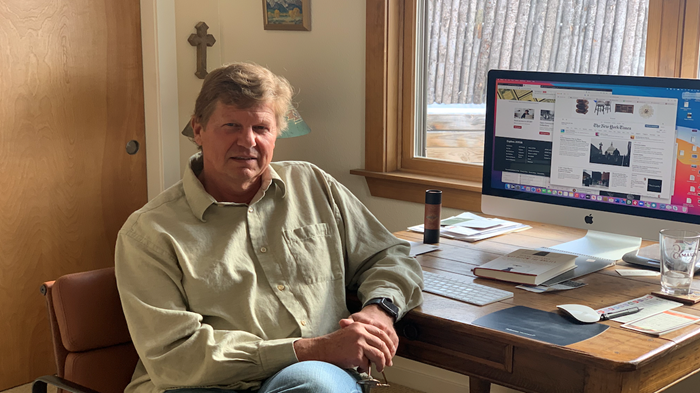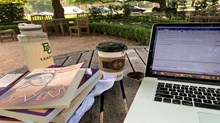Randall Balmer: How and Where I Write

David George Moore
It’s been my privilege to be in the personal spaces of several writers. Among others, Pulitzer winner Tony Horwitz warmly welcomed me at his home on Martha’s Vineyard as did William F. Buckley at his place on Long Island Sound.
I have interviewed over 200 authors. Everyone has their own style with reading, capturing what they have read, research, and then writing. As I writer myself, I have settled on an approach I feel comfortable with.
Moore: Do you still acquire books as you get older or have you slowed down a bit?
Balmer: I’ve slowed down considerably, especially from my early days as a scholar when I felt almost frantic to build my library (lots of trips to the Strand Bookstore in Manhattan). Now, I’m even to the point of divesting. Moving helps a lot; Dartmouth is currently renovating our building, and I was able to donate twenty-five boxes of books.
Moore: What are the best time(s) and place(s) for you to write?
Balmer: I tend to write in my study most often, though occasionally on a laptop when I’m traveling. As for timing, I write almost anytime, though I’m better in the mornings. Sometimes I wake up and find that I’ve been turning a phrase or an argument in the night, so I’m eager to get started.
Moore: How do you capture your research? Old school with note cards etc., or new school with computer programs?
Balmer: I don’t have any specialized computer program. I tend to take extensive notes in Word while doing archival research and then integrate that material into the narrative.
Moore: Do you immediately start writing on the computer (perhaps typewriter) or by longhand?
Balmer: I was the first doctoral student in the Religion Department at Princeton to write his dissertation on computer. In those days (early 1980s) that entailed schlepping to the computer center at the far end of Prospect Street to key in the manuscript, print it out, make edits by hand, and return to key in the changes. I’ve been writing by computer ever since, although I acknowledge Barack Obama’s point that the danger of doing rough drafts on a computer is that the program tends to reify both the argument and the prose.
Moore: Do you put marginalia in your physical books?
Balmer: I do, but increasingly only in pencil, which makes it easier to sell or donate the books.
Moore: Do you read digital books?
Balmer: No.
Moore: What is some good advice you received on writing?
Balmer: I love Eudora Welty’s rejoinder to those who supposed that she enjoyed writing: “I love to have written.” But I actually do enjoy writing. It’s how I think and work through ideas, and the satisfaction of finding just the right word or phrase is utterly exhilarating. (Mark Twain said that the difference between “the almost right word and the right word” is the difference between a lightning bug and lightning.) At Princeton, Jeffrey Stout used to tell doctoral students to write at least a page a day, which is good advice, but I’ve never really needed those prods. I tend to write pretty much all the time, and when I’m focused on something—completing a manuscript, for instance—nothing can keep me away.
The other point about writing is not something that anyone told me; I guess I came to it intuitively. I believe that scholars have an obligation to communicate beyond the safety of their narrow, specialized academic circles—which, by the way, have constricted more and more in recent decades. Part of the reason that our society is in such trouble, I believe, is that responsible scholars have ceded the public square to charlatans and pseudo-intellectuals like David Barton and Eric Metaxas. When I began doctoral studies, I vowed that I would never allow my scholarship to become so recondite that I could not communicate at least something to a general audience. I began in graduate school to develop the discipline of writing op-ed pieces, initially with my hometown newspaper, the Des Moines Register; I’ve sustained that discipline throughout my career, although the venues have changed over the years depending on opinion page editors. (At present, most of my commentaries appear in the Los Angeles Times, the Santa Fe New Mexican, the Concord Monitor and the Valley News, a local newspaper in Vermont and New Hampshire.)
That said, I want to stipulate that the best and most effective way for scholars to contribute to public discourse is first to establish their scholarly credentials. I recently stepped down from a five-year stint as inaugural director of the Society of Fellows at Dartmouth. We offered highly competitive three-year postdoctoral fellowships (the first year we received more than 1750 applications for five fellowships). The people we brought in were highly promising. Many of them lived up to that promise, but far too many decided they wanted to become activists on some issue or another, which they pursued to the neglect of their scholarship. I have no objection to activism, and most of the issues they chose were ones I consider worthy. But I continue to believe that their advocacy over the course of their careers would have been more compelling if they had first established their credentials as scholars. (That sentiment, as you might expect, did not make me terribly popular.)
Moore: What do you think is your best book?
Balmer: My wife would say that it’s Mine Eyes Have Seen the Glory: A Journey into the Evangelical Subculture in America (now in its fifth edition). I think my best book is Redeemer: The Life of Jimmy Carter, although the publisher has gone to extraordinary lengths to keep it a secret.
Moore: Please name a few of your favorite authors from your own field of study.
Balmer: I’m reluctant to do so for fear that, by omission, I will slight a colleague.
Moore: What is a book you should have read by now, but haven't? This will make all of us sleep better!
Balmer: I have not read the second volume of Perry Miller’s The New England Mind, the one with the subtitle From Colony to Province.
David George Moore is the author of the forthcoming Stuck in the Present: How History Frees and Forms Christians (Leafwood/Abilene Christian University Press). Stuck in the Present: David George Moore: 9781684264605: Amazon.com: Books
Jesus Creed is a part of CT's
Blog Forum. Support the work of CT.
Subscribe and get one year free.
The views of the blogger do not necessarily reflect those of Christianity Today.



















